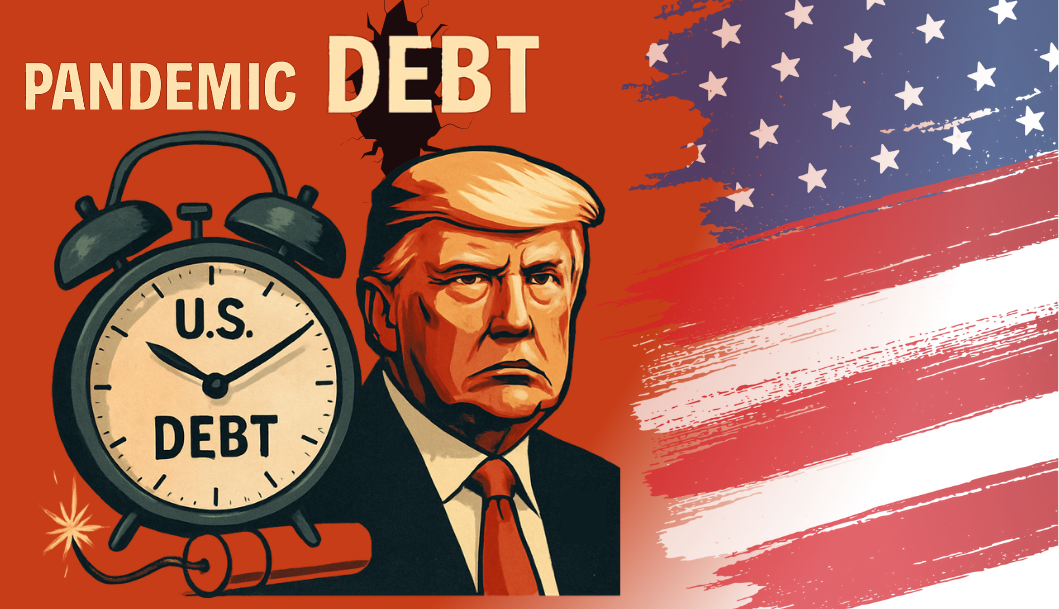How Trump’s Tariff Policy and Pandemic Debt Created the U.S. Treasury Time Bomb

(Photo generated by ChatGPT)
Debt Crisis Incoming? How Trump’s Trade War and Pandemic Borrowing Sparked a Fiscal Storm
In the chaotic aftermath of COVID-19, the U.S. government cracked open its fiscal toolbox like a desperate mechanic fixing a crashing plane mid-air. With stimulus checks flying, business bailouts booming, and the CARES Act bulldozing budget boundaries, Washington did what it knows best: it borrowed. A lot. And not just any kind of borrowing — we’re talking about an avalanche of short-term Treasury bills (T-Bills), essentially IOUs on speed.
At the heart of the storm was the Federal Reserve, wielding a bazooka called "unlimited QE." Starting March 2020, it scooped up at least $80 billion in Treasuries every month like a Wall Street Black Friday spree. The Fed’s balance sheet swelled from $4.2 trillion to over $8.5 trillion faster than you can say "macroeconomic stability." But here’s the twist: while this move calmed markets, it planted the seeds for an even bigger mess — trillions in debt set to mature almost simultaneously. A fiscal game of Jenga, and we’re now pulling the bottom blocks.
Fast forward to 2024 and 2025, and the hangover is here. In 2024 alone, $8.9 trillion in U.S. debt is coming due — that’s not just a number; it’s a financial mountain. For 2025, the estimates range from $3 trillion to $9.2 trillion depending on how you slice the Treasury pie. Either way, it’s a refinancing circus. Why? Because short-term debt is like fast food: cheap, convenient, and dangerous when consumed in excess.
Now toss Trump’s tariff policies into the mix. While the marketing spin said "protect American jobs," the economic reality hit like a gut punch. Tariffs didn’t just slap foreign producers — they ricocheted and bruised U.S. firms, hiking input costs and shrinking profit margins. But wait, there’s more: behind the scenes, a subtler drama unfolded. Some analysts argue the tariff regime subtly coaxed U.S. companies into lobbying harder and opening their wallets wider for political donations. Academic research shows that firms with strong political ties were significantly more likely to receive tariff exemptions. In other words: the more you schmooze, the less you lose. (Sources: Lehigh University, Washington Monthly, Public Citizen)
Let’s be clear: there’s no smoking memo stating "raise donations to dodge tariffs." But the data speaks volumes. The process for exemption seemed less like a fair application and more like a VIP lounge — access granted if you knew the right people.
Meanwhile, tariffs’ actual fiscal firepower? Let’s just say it’s more sparkler than stick of dynamite. In 2024, total tariff revenue was about $90 billion. Sounds big until you remember the U.S. pays nearly $1 trillion annually in interest alone. That’s like trying to fund a yacht party with loose change.
So where does this leave us? In a high-stakes balancing act between political optics and economic reality. The short-term debt pile is ticking louder, and tariffs — flashy as they may be — aren’t fixing the fuse. What they have done, perhaps more effectively, is reshape how businesses engage with Washington, incentivizing influence over innovation.
In the end, the story isn’t just about numbers. It’s about pressure, power, and the price of playing politics with national finances. If the Treasury time bomb ticks any louder, even the sound of lobbyists knocking on Capitol Hill might not drown it out.
















